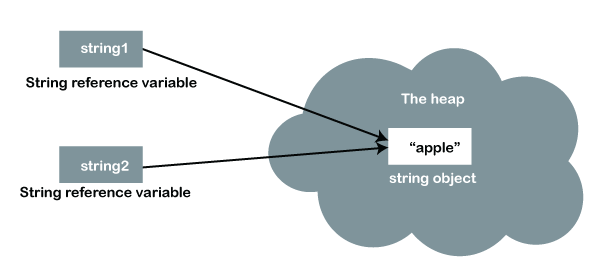Discovering the Benefits of Unalterable Strings in Modern Programs Paradigms
In the world of modern-day shows paradigms, the idea of immutable strings stands as a foundation of durable software application advancement. By taking on unalterable strings, programmers can make sure enhanced information integrity, boosted string security, streamlined debugging processes, boosted protection steps, and reliable performance optimization.
Improved Information Integrity

By preventing the alteration of string objects, immutability eliminates the danger of unintentional adjustments to the data they hold. This not just boosts the security of the info but likewise improves the dependability of the code that relies on these strings.
Immutability likewise supports safer multithreading atmospheres, as concurrent accessibility to unalterable strings does not position the threat of information corruption through synchronised alterations. This residential property simplifies the process of managing strings in parallel programming circumstances.
Essentially, immutability serves as a protective guard around the data saved within strings, boosting their stability by making sure that once specified, their worths stay the same throughout the program's implementation.

Enhanced String Safety
Unalterable strings boost the thread safety and security of programs by making sure that as soon as a string item is developed, its value can not be changed. This residential or commercial property gets rid of the risk of concurrent strings attempting to modify the exact same string simultaneously, which might bring about data corruption or irregular states in the program - Why are strings immutable in Java?. In a multi-threaded environment, where numerous threads gain access to and manipulate information concurrently, the immutability of strings provides a level of safety by ensuring that the data stays unmodified throughout its lifecycle
Simplified Debugging Procedures
Offered the enhanced string safety helped with by unalterable strings, a substantial benefit develops in the world of streamlined debugging procedures. Immutable strings, when developed, can not be altered, making it much easier to map the flow of data and identify the resource of bugs in a program. This immutability ensures that strings remain constant throughout the implementation of the program, minimizing the likelihood of unexpected changes that could lead to mistakes.
When debugging with mutable strings, programmers frequently encounter concerns where a string's worth is modified accidentally, making it testing to pinpoint the origin of an insect. Nonetheless, with immutable strings, the data stays unchanged, allowing programmers to concentrate on assessing the actual reasoning of the code rather than tracking down where and when a string was customized inaccurately.
In addition, unalterable strings streamline the debugging procedure by allowing much easier reproduction of insects. Given that unalterable strings do not alter state, designers can recreate and examine insects better, bring about quicker identification and resolution of issues within the codebase. This structured debugging workflow eventually contributes to higher software high quality and enhanced total advancement effectiveness.

Boosted Protection Measures
Enhancing information defense and strengthening system integrity, the utilization of unalterable strings in software program applications adds significantly to raised security procedures. Unalterable strings, when created, can not be customized, providing a crucial protection against destructive tampering or unapproved gain access to. By making certain that delicate data stored in strings continues to be unchanged throughout the program's execution, the risk of information violations or injection strikes is considerably lowered. Why are strings immutable in Java?. Immutable strings likewise check out here play an essential role in avoiding usual protection susceptabilities such as barrier overflows and SQL shot assaults, as efforts to control string information at runtime are naturally restricted.
Moreover, the immutability of strings improves the predictability of program behavior, making it simpler to confirm inputs and stop unforeseen modifications that can compromise safety and security. This predictability streamlines the process of bookkeeping and verifying code, making it possible for developers to recognize potential protection technicalities much more successfully. In general, integrating unalterable strings right into software program development practices not just improves the toughness and dependability of applications yet also reinforces their durability versus protection dangers.
Reliable Performance Optimization
When dealing with mutable strings, operations like concatenation or substring development frequently result in the creation of brand-new string items, leading to memory expenses and enhanced handling time. By allowing strings to continue to be consistent and stable, immutable strings facilitate better memory management and caching this post chances, ultimately improving the total performance of the software.
Considering that unalterable strings can not be modified as soon as created, they can be shared across threads without the danger of unexpected modifications, lowering the demand for synchronization systems and boosting concurrency. Immutable strings simplify debugging procedures as developers can rely on that a string's worth will certainly stay constant throughout the program's execution, eliminating prospective errors triggered by mutable state adjustments.
Conclusion
To conclude, the advantages of making use of immutable strings in modern-day programs standards can not be overemphasized. Enhanced information honesty, boosted string safety and security, simplified debugging processes, enhanced protection steps, and effective efficiency optimization all add to the general efficiency of programs tasks. By incorporating unalterable strings into shows techniques, developers can gain from an extra reputable and robust codebase.
Immutability, a key feature of strings in programs languages such as Java and Python, makes certain that when a string things is created, it can not be altered or customized.Unalterable strings boost the thread safety of programs by making certain that when a string item is developed, its worth can not be changed. Immutable strings also play a vital role in stopping typical security susceptabilities such as barrier overflows and SQL injection strikes, Continue as efforts to adjust string data at runtime are naturally restricted.
By permitting strings to stay stable and continuous, unalterable strings facilitate much better memory administration and caching chances, ultimately increasing the general efficiency of the software program.
Immutable strings streamline debugging processes as programmers can trust that a string's value will certainly stay consistent throughout the program's implementation, eliminating possible mistakes triggered by mutable state adjustments.
Comments on “Why Are Strings Immutable in Java? Understanding the Core Concepts”